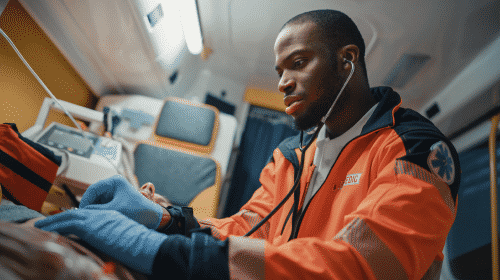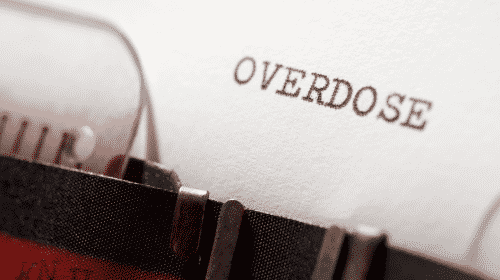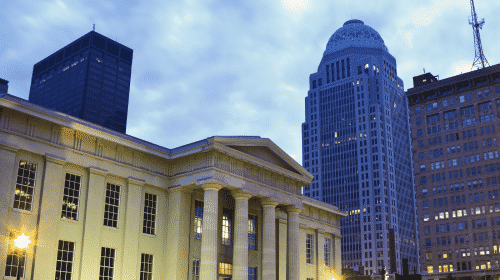Expert Insights
Back in 2017, Kentucky was one of many states to file suit against several giant pharmaceutical manufacturers and companies for their role in creating and contributing to the opioid epidemic. Those pharmaceutical companies – McKesson Corp. and Johnson and Johnson, AmerisourceBergen Corp, and Cardinal Health Inc. – ultimately agreed to a national settlement worth over $26 billion dollars. Louisville will receive over $30 million dollars of that settlement. So, what does the city plan on doing with that money?
The settlement funds in Louisville will be used to create desperately needed treatment and prevention efforts. The first $2.6 million is set to be used in the promotion of long-term recovery by funding transportation and housing for people who are recovering from various addictions. Additionally, funds will be put towards programs that help incarcerated inmates get off (and stay off) drugs. Another $744,000 has been earmarked for the expansion of free Naloxone, known as the anti-overdose drug, overdose prevention programs, and funding prevention programs for Kentucky’s children.~ Nikki Seay
Top Drug Rehabs in Louisville, KY
Every alcohol and drug rehab in Louisville offers its own set of unique amenities, programs, and therapies. Evidence-based treatment is available at multiple inpatient centers in Louisville. These facilities often provide a range of therapies, faith-based treatments, and outpatient options for recovery.
Below are the top addiction treatment centers in Louisville based on the following criteria:
- Offering evidence-based treatment
- Accreditation
- Certifications
- Client testimonials / reviews
Landmark Recovery of Louisville
Landmark Recovery of Louisville is located on Fern Valley Road, in a residential area near the Lynnview and Highview neighborhoods. The 64-bed facility offer evidence-based inpatient and outpatient substance abuse treatment at an affordable cost. Most inpatient stays are 30-45 days.
Treatment programs include:
- Medical Detox
- Medication-assisted Opioid Treatment
- Inpatient Treatment
- Intensive Outpatient Treatment
- Partial Hospitalization Program
- Alcohol Rehab
- Drug Rehab
- Co-occurring Disorders
- Military Program
- Recovery Coaching Program
- Recreational Therapy
- Alumni Programs
- Workout Room
Treatment programs are supported by:
- Joint Commission
- LegitScript
Location and contact information:
4112 Fern Valley Rd.
Louisville, KY 40219
502-309-2675
Cornerstone of Recovery
Cornerstone of Recovery provides specialty programs such as a young adult program, chronic pain programming, healthcare professional treatment services, legal and business professional treatment services, and programs for Veterans and active military personnel.
Cornerstone of Recovery specializes in:
- Detox
- Residential
- Long-term rehab
- Outpatient
- Emergency Consultation Services for Professionals
Treatment programs are supported by:
- LegitScripts
- The Joint Commission
Location and contact information:
4726 Airport Highway
Louisville, Tennessee 37777
(865) 509-9352
The Healing Place
Connecticut Addiction Medicine, located between Middle Street and Main Street in Bridgeport, treats all kinds of substance abuse, and specializes in opioid addiction and alcoholism. Treatment also addresses substance-abuse associated mental health/ behavioral issues. Criminal justice referrals are accepted.
Treatment programs include:
- Detox
- Alcohol Rehab
- Drug Rehab
- Men’s and Women’s Campuses
- Young Adult Program
- Outpatient Treatment
- Court-ordered Treatment
- Recovery Group Meetings
- Case Management Services
- Sober Housing
- Aftercare Support
- LGBTQ Friendly
Treatment programs are supported by:
- Legit Script
Location and contact information:
Men’s Campus
1020 W. Market
Louisville, KY 40202
502-585-4848
Women’s Campus
1503 S. 15th
Louisville, KY 40210
502-585-4848
Center for Behavioral Health
Center for Behavioral Health in Louisville is part of the Behavioral Health Group nationwide network. They offer evidence-based treatment and specialize in treating opioid disorder, using Medication-Assisted Treatment (MAT) and behavioral health counseling.
Treatment programs include:
- Detox Treatment
- Outpatient Rehab
- Dual Diagnosis Treatment
- Men’s Rehab Program
- Women’s Rehab Program
- Opioid Rehab
- Young Adult Program
Treatment programs are supported by:
- Joint Commission
- Commission on Accreditation of Rehabilitation Facilities (CARF)
- SAMHSA (opioid certification)
Location and contact information:
1402 Browns Lane
Louisville, KY 40207
502-894-0234
CleanSlate Outpatient Addiction Medicine Louisville
CleanSlate Outpatient Addiction Medicine Louisville is located on the 8th floor of the Norton Gray St. Medical Office Building in Louisville. They offer telehealth treatment as well as outpatient treatment for alcohol and drug addiction, using evidence-based therapies and Medication-Assisted Treatment (MAT).
Treatment programs include:
- Detox
- Medication-Assisted Treatment (MAT)
- Outpatient Rehab
- Opioid Rehab
Treatment programs are supported by:
- Commission on Accreditation of Rehabilitation Facilities (CARF)
Location and contact information:
6801 Dixie Hwy. #132
Louisville, KY 40258
502-657-2701
How Does Louisville Compare in Alcohol and Drug Use?
With a population of more than 320,000, Louisville is the 2nd-largest city in Kentucky.1 However, addiction remains a critical public health and safety issue facing the residents of Louisville. In particular, the abuse of prescription drugs, heroin, methamphetamine, and fentanyl, has led to an alarming increase in overdose deaths. In 2019, there were 1,316 overdose deaths in the state. In 2020, there were 1,964 – a 49% increase from 2019. In 2021, there were 2,250 overdose deaths – a 14.5% increase from 2020.2 To combat this problem, there are over 60 accredited alcohol and drug rehab centers in Louisville and the surrounding area.3
Substance use disorder is a public health crisis in Louisville.5 It’s an issue that affects individuals, families, and communities. Statistics show that addiction is a pervasive issue that affects every area of Louisville:5,6

In 2016, the city’s Emergency Medical Services responded to overdose calls in every Louisville zip code.

Overdose deaths have increased every year for the past decade.

512 Jefferson County residents died of a drug overdose in 2020.

539 Louisville residents died of alcohol-related causes between 2011-2016.
Drug and alcohol use isn’t limited to Louisville. The entire state of Kentucky is affected by this crisis: 15% of Kentucky residents reported using drugs in the last year, and 15.8% of Kentucky residents reported engaging in excessive drinking in 2021.7,8
Not everyone who uses drugs and alcohol is addicted. However, research shows that repeated alcohol or drug abuse can lead to substance use disorders.9 People who develop substance use disorders experience a change in how their brain is wired, which causes intense cravings. This makes it difficult to stop drinking or using drugs on willpower alone.9
Finding drug or alcohol rehabs in Louisville can help you or your loved one overcome addiction.
How Expensive is Drug Rehab in Louisville?
The cost of addiction treatment in Louisville can vary, depending on the facility and your specific needs. Several factors play a role in the cost, including:
- The type of care needed
- Setting: inpatient vs. outpatient
- Length of the program: 30 days vs. 90 days
- Amenities offered by the facility: luxury vs. standard
- Location of the facility: rural vs. city
Understandably, inpatient (residential) programs cost more because you will live, eat, and sleep at the facility for the duration.10 You are there 24 hours a day, seven days a week, which requires the facility to have staff on duty around-the-clock to provide support.
If you have health insurance, at least some of the costs should be covered by your health plan.11 Call the number on the back of your insurance card to inquire about your plan’s coverage for substance use disorder programs. You may want to ask for a list of addiction treatment centers in Louisville that are in-network with your health insurance provider to ensure insurance coverage is provided.
Are There Low-Cost and Free Drug Rehab Centers in Louisville?
About 30% of people who need help did not get into a facility because they do not have healthcare coverage and/or could not afford the cost on their own.10
In 2020, 12.28% of Kentucky residents with substance use disorders did not get the help they needed.12
Accredited low-cost or free drug rehabs in Louisville receive government funding to help provide care for low-income individuals.13 Some low-income Kentucky residents may qualify for the state’s voucher program that helps cover the costs of a residential program for drug-related addictions.14
A wide variety of options are available for people affected by drug and alcohol use. State-funded facilities may provide the following options in Kentucky:
- Detox centers
- Day treatment
- Inpatient
- Outpatient
- Residential programs
- Intervention and prevention efforts
How Do You Pay for Addiction Treatment in Louisville?
Free and low-cost clinics often have a waitlist because the demand is higher than the number of spaces available. If you want to get into addiction treatment right away but don’t have health insurance or the financial means to pay out-of-pocket, there are other ways to help you cover the costs.
Choose a Program that Offers Payment Plans
Many centers in Louisville provide payment plans for people who cannot afford to pay for the total cost in one lump sum. Payment plans are typically paid in monthly installments, like the way you pay your monthly rent and car payment. Some programs give people a grace period (e.g., six months) after they have completed care before payment installments begin. The grace period gives you a chance to get settled in your community, get a steady job, and establish yourself before payments begin.
Apply for a Scholarship
Some Louisville detox centers and rehab facilities offer scholarships to help people unable to pay for the cost of getting the help they need. The specifics of the types of scholarships offered, who qualifies for the scholarships, how much of the cost is covered, and how many scholarships are available at any given time vary. Call the center you are considering to ask about scholarship opportunities and how to apply.
Sliding-Scale Options
A sliding scale is a flexible fee system that determines the cost based on certain factors, such as a person’s financial situation and their current ability to pay out-of-pocket. Many places offer sliding-scale fees to increase both affordability and accessibility for people who need to access lifesaving addiction care. Most consider certain factors to determine how much you will be expected to pay for help, such as your total household income and the extent of insurance coverage you have.
Choosing the Right Level of Care
As you consider the type of care you want to receive, spend some time considering whether an inpatient or outpatient program will be best to help you recover.
Medical Detox
The first step in the recovery process, the goal of a detox is to manage painful withdrawal symptoms and to obtain a substance-free state. Once you complete a detox, you’re ready to transition into comprehensive addiction treatment.
Inpatient
The most intensive and structured setting, inpatient rehabilitation offers round-the-clock services and is best for someone with a severe addiction or who outpatient has previously not worked for.
Partial Hospitalization Programs (PHPs)
Partial hospitalization, also known as day treatment, can offer a high level of care and support—up to 30 hours per week— while still allowing you to return home in the evening.
Intensive Outpatient Programs (IOPs)
IOPs are usually less intensive than a PHP but still offer a higher frequency of care than standard outpatient. An IOP includes up to 20 hours of therapy per week.
Standard Outpatient
This option offers you the most flexibility, as you only need to attend a few hours of therapy per week.
Aftercare
After rehab, you’ll want to put together an aftercare plan that provides you with ongoing support. 12-step meetings or group counseling work great for this.

Finding Specialized Drug Rehabs in Louisville
Addiction treatment facilities in Louisville provide a judgment-free, safe environment to support your recovery. Some facilities provide services for certain populations, such as veterans. Others take a different approach, so you can find a facility that aligns with your values.
Holistic
Holistic programs focus on treating the whole person, including focusing on their emotional, physical, and social well-being.19, p1 They promote healing by addressing all these aspects in connection with addiction and its consequences. They combine standard care with holistic approaches, such as meditation, yoga, massage therapy, and acupuncture.
Christian and Faith-Based
Faith-based centers in Louisville weave a religious and spiritual element into aspects of addiction treatments to address a person’s medical and spiritual needs.20 Spiritual advisors are often on staff, such as Christian pastors, to provide guidance, counseling, and spiritual teachings. Many people affiliated with a certain faith prefer to attend these centers because they find strength and peace through their faith.
Luxury
Luxury centers in Louisville provide standard care in a luxurious, private, and comfortable environment. Many luxury facilities boast a low staff-to-patient ratio to ensure each client gets individualized attention. They are usually in beautiful settings, such as on the beach or nestled in the mountains. Most offer high-value amenities, including full gym facilities, gourmet meals, aromatherapy, private rooms, and more.
Executive
Executive centers are designed for high-level professionals, such as Chief Executive Offers, for whom getting away from work responsibilities is often difficult. These executive programs often allow patients to have access to their computers, phones, and conference rooms so they can attend to their professional duties in some capacity while enrolled.
Dual Diagnosis
When a person has a substance use disorder and a co-occurring mental health condition, this is known as a “dual diagnosis.”21 These programs treat both substance use disorder and co-occurring mental health disorders to improve a person’s chance of a full, long-term recovery.
Types of Addiction Therapy Used in Louisville Drug Rehabs
Addiction is a complex, treatable disease that affects a person’s brain and behavior. There is no “one size fits all” approach to addiction that will work for everybody. Many types of addiction therapy are provided during care, and the types of therapy you receive will depend on your needs and the therapy offerings at the Louisville facility you choose to attend.
Cognitive Behavioral Therapy
Cognitive behavioral therapy (CBT) focuses on helping patients identify their own problematic thought patterns and actions and to increase their understanding of how these behaviors impact their substance use. CBT is based on the idea that psychological problems are often rooted in faulty ways of thinking.
Dialectical Behavior Therapy
Dialectical behavioral therapy is a form of psychotherapy intended to help people change problematic thoughts and behaviors by learning to manage and change negative emotions rather than trying to escape from them.
Motivational Enhancement Therapy
Motivational enhancement therapy (MET) is a form of therapy that helps individuals strengthen their internal motivation and create a plan for change. Individuals with SUDs often have mixed feelings about changing their behaviors, even when they are aware of the damage caused by their addiction. MET has been used to improve engagement with programs and reduce problematic behaviors.
Contingency Management
Contingency management uses positive reinforcement to help build positive habits. This approach uses strategic rewards or incentives to encourage behaviors such as attending treatment sessions and engaging in recovery-focused activities.
Group Therapy
Group therapy can be highly beneficial to individuals in a drug or alcohol program. Group counseling provides a safe environment in which patients can build their communication skills and learn from others who have been in their situation.
Family Therapy
Family therapy is integral to many programs. Research shows that when combined with individual counseling, family therapy can help reduce stress, improve mental health conditions, and help prevent relapse.12

Should You Travel for Drug and Alcohol Rehab in Louisville?
If you don’t live in Louisville, you may wonder if you should travel to the city to get help. The choice is yours, but here are some reasons you may want to consider it:
- You want to live in an area that experiences all four seasons.
- There is a specific Louisville program you want to attend.
- You need a change of scenery from your current city of residence.
- You used to live in Louisville and miss the city and/or want to return.
- You have family and friends in Louisville who can provide ongoing support in your recovery.
- Your health insurance covers care in Louisville.
Alcohol and Drug Laws in Louisville
Casey’s Law: Casey’s Law is a legal proceeding that provides a court order to place a person into an addiction program involuntarily. This law provides a way to intervene with someone unable to recognize their need for help.31 Parents, relatives, and friends can petition the court on behalf of the person with substance use disorder and ask for a court order to place the person in a substance abuse program.31
Jefferson County Drug Court: The Jefferson County Drug Court is an alternative sentencing program available for non-violent offenders whose crimes stem from substance abuse.32 Participants can enter this rather than go to jail or in lieu of probation revocation. Drug Court aims to break the cycle of substance use, addiction, and crime by requiring defendants to attend a program to help encourage their recovery and reduce crime rates.
Kentucky Good Samaritan Law: The Kentucky Good Samaritan Law states that anyone who calls 911 for help for themselves or another person who is experiencing a drug overdose cannot be charged or prosecuted for possession of drugs or drug paraphernalia, but only if they remain with that person in need of help before first responders arrive on the scene.33
Resources
- World Population Review. (2022). Louisville, Kentucky population.
- Harvey, K., & Ingram, V. (n.d.). Commonwealth of Kentucky Justice & Public Safety Cabinet.
- FindTreatment.gov. (n.d.). FindTreatment.gov.
- Britannica. (2022). Louisville.
- Louisville Jefferson County Government. (2022). Diversity shines.
- Britannica. (2022). Louisville summary.
- Louisville Department of Public Health and Wellness. (2018). Coming together for hope, healing and recovery.
- Commonwealth of Kentucky. (2020). 2020 Overdose Fatality Report Kentucky Office of Drug Control Policy.
- United Healthcare America’s Health Rankings. (2022). Non-medical drug use past year in Kentucky.
- United Healthcare America’s Health Rankings. (2022). Excessive drinking in Kentucky.
- Louisville Center for Health Equity. (2017). Louisville Metro Health Equity Report 2017.
- U.S. Department of Health and Human Services. (2016). Early intervention, treatment, and management of substance use disorders.
- Healthcare.gov. (n.d.). Mental health and substance use coverage.
- Substance Abuse and Mental Health Services Administration. (December 2021). 2019-2020 NSDUH state-specific tables.
- Kentucky Housing Corporation. (2022). Recovery Kentucky.
- Kentucky Office of Drug Control Policy. (2022). Treatment and recovery resources.
- University of Kentucky. (2022). Start here to find addiction treatment openings.
- National Institute on Drug Abuse. (2018, January). Types of treatment programs.
- National Institute on Drug Abuse. (2014, January). Treatment settings.
- Kentucky Cabinet for Health and Family Services. (2017). Behavioral health and substance use disorder.
- American Psychological Association. (2014). Revisiting holistic interventions in substance abuse treatment.
- Substance Abuse and Mental Health Services Administration. (2022, March). Faith-based and community initiatives.
- National Institute on Drug Abuse. (2010). Comorbidity: addiction and other mental illnesses.
- National Institute on Drug Abuse. (April 2020). Part 1: The Connection Between Substance Use Disorders and Mental Illness.
- U.S. Department of Veterans Affairs. (n.d.). PTSD and substance abuse in veterans.
- Parmar, A., Kaloiya, G. (2018). Comorbidity of Personality Disorder among Substance Use Disorder Patients: A Narrative Review. Indian Journal Psychological Medicine, 40(6), 517-527.
- National Institute on Drug Abuse. (2018, January). Principles of effective treatment.
- Linehan, M.M. and Wilks, C.R. (2018, April 30). The Course and Evolution of Dialectical Behavioral Therapy. The American Journal of Psychotherapy, 69(2).
- National Institute on Drug Abuse. (2018, January). Motivational Enhancement Therapy (Alcohol, Marijuana, Nicotine).
- Louisville. (2022). Old Louisville.
- Louisville. (2022). NuLu.
- Louisville. (2022). Clifton & Crescent Hill.
- Casey’s Law. (n.d.). About Casey’s Law.
- Office of the Commonwealth’s Attorney Thomas B. Wine Jefferson County, KY. (n.d.). Drug court liaison.
- Kentucky Harm Reduction Coalition. (2021). Intervention law.




